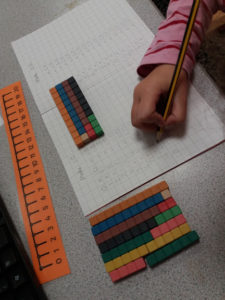Dyscalculia
What is Dyscalculia?
Navigating your child’s educational journey can be a rewarding yet challenging experience. As your child progresses through school, you may encounter various learning differences. One such challenge is dyscalculia, a term you might have come across but might not fully understand. In this guide, we’ll explore what dyscalculia is, its possible indicators, and provide insights to help you support your child.
What is Dyscalculia?
Dyscalculia is a learning difficulty that specifically affects a child’s ability to acquire mathematical skills. Unlike a temporary struggle with a particular concept, dyscalculia is a persistent condition that hinders the development of basic arithmetic skills, number sense, and mathematical reasoning.
 Possible Indicators:
Possible Indicators:
- Difficulty with Basic Arithmetic:
- Struggles with basic addition, subtraction, multiplication, and division.
- Difficulty in understanding and remembering mathematical facts.
- Poor Number Sense:
- Struggles to grasp the magnitude of numbers.
- Difficulty in comparing numbers or understanding their order.
- Spatial and Temporal Challenges:
- Difficulty understanding and using concepts of time and space in a mathematical context.
- Struggles with understanding and using graphs and charts.
- Memory Challenges:
- Difficulty in recalling mathematical concepts and sequences.
- Struggles to remember and follow multiple steps in problem-solving.
- Difficulty in Learning Mathematical Concepts:
- Finds it challenging to understand abstract concepts such as fractions and percentages.
- Struggles with understanding and applying mathematical rules.
- Inconsistency in Mathematical Performance:
- Demonstrates an inconsistency in mathematical performance, performing well in some areas but struggling in others.
 Understanding the Rarity of Dyscalculia:
Understanding the Rarity of Dyscalculia:
While dyscalculia can present challenges, it’s essential to note that it is relatively rare. Estimates suggest that approximately 5-7% of the population may have dyscalculia. This means that, though challenging, your child’s struggles with mathematics may not necessarily be indicative of dyscalculia. It’s crucial to consider various factors, including teaching methods, individual learning styles, and the pace of learning.
Supporting Your Child:
- Early Intervention:
- If you notice persistent challenges in your child’s mathematical development, consider seeking early intervention.
- Speak to your child’s teacher about observations and concerns.
- Multisensory Learning:
- Explore different learning methods that engage multiple senses.
- Incorporate visual aids, hands-on activities, and real-life examples into mathematical learning.
- Patient and Positive Encouragement:
- Provide a positive and patient environment for your child to learn.
- Celebrate small victories and progress, fostering a positive attitude towards mathematics.
- Professional Assessment:
- If concerns persist, consider seeking a professional assessment from an educational psychologist or specialist.
Conclusion:
In conclusion, dyscalculia is a specific learning difficulty that affects mathematical skills, but it is relatively rare. If you suspect your child may be experiencing challenges in mathematics, it’s essential to approach the situation with understanding, patience, and a proactive mindset. By identifying potential indicators early and providing appropriate support, you can empower your child to navigate the world of mathematics with confidence and resilience. Remember, every child learns at their own pace, and with the right support, they can overcome challenges and thrive academically.



